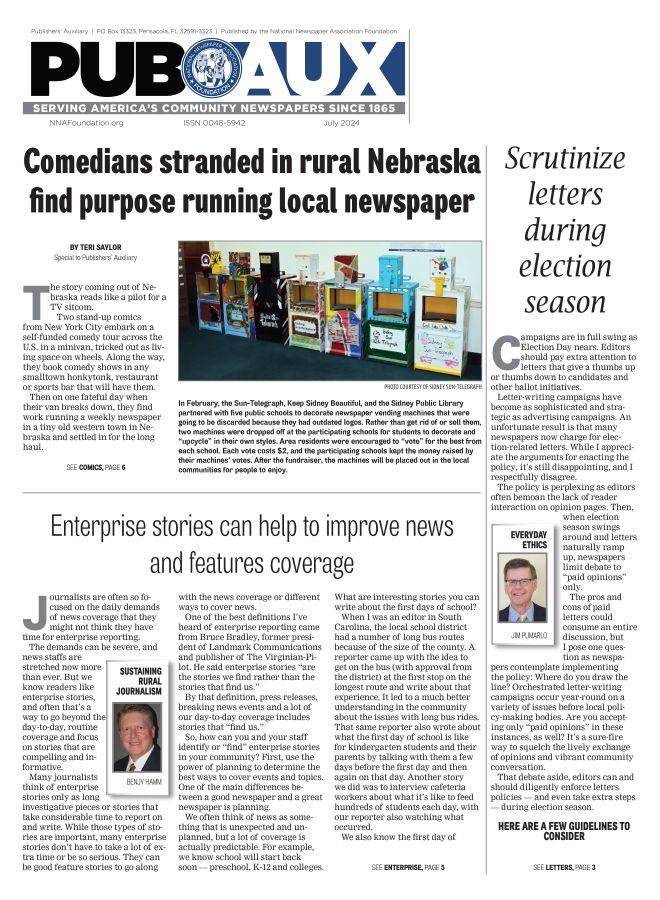Background checks to buy firearms finds some consensus
Apr 30, 2013
The first class of National Newspaper Association Foundation News Fellows arrived in Washington, concurrently with the “We Believe in Newspapers Leadership Summit” to test their news literacy skills on one of the nation’s toughest subjects: gun control legislation.
Five college journalists sponsored by state press associations and journalism schools were selected for the inaugural news literacy program. They were paired with working community newspaper journalists and set up for a couple of key news briefings. Then they were on their own to roam Capitol Hill, the K Street lobbying corridor and other venues in the nation’s capital to try to find out who is shaping public opinion on gun control and how.
University of Georgia
Five years ago, David Steed started a career as a state corrections officer working in Athens, GA. In that time, multiple culprits felt the cold steel of his handcuffs on their wrists for illegally carrying firearms.
“I’ve never been in a personal situation where I’ve had to deal with gun violence myself, but I’ve dealt with several situations where we’ve arrested offenders for carrying firearms illegally,” he said.
Even though Steed deals regularly with criminals who illegally obtain and carry guns, he still describes himself as a “proponent of Second Amendment rights,” and doesn’t believe the concealed carrying of firearms necessarily makes the Athens community more dangerous.
“Most of the people that I’ve known who are licensed to carry concealed weapons have been through training; been through some type of certification, and they seem to be pretty respectful of the power they hold,” he said. “So I see it as the ability of someone to defend themselves.”
But many others gain access to guns, some at gun shows or via the Internet, with the intent of doing more than protecting their persons or their property.
Universal background checks, even at gun shows, are an area where different ideologies seem to find common ground, as many people consider them potentially useful tools to prevent guns from ending up in the wrong hands.
“Our organization is enthusiastically in support of mandatory background checks before the transfer of a firearm at gun shows,” Richard Feldman, president of the Independent Firearms Owners Association, said in a March debate on gun control held at the University of Georgia.
A Gallup poll conducted in December found that 58 percent of Americans would support stricter laws covering the sale of firearms. However, another December Gallup poll found an overwhelming 92 percent would favor a law requiring background checks before people, including gun dealers, could buy guns at gun shows.
However, the definitions and implications of a background check system are often unclear.
Currently, federal law does not enforce background checks for gun sales between private individuals, such as at gun shows, between friends, or between private citizens on the Internet.
The Coalition to Stop Gun Violence estimates that 40 percent of guns are purchased in private transactions annually. However, that number has been widely contested by various groups, including FactCheck.org, which claims that statistic is based on a 1997 study of less than 300 individuals.
Still, many acknowledge that guns sold through avenues other than a licensed retailer pose a problem.
“Right now, if you were going to a gun show in Georgia and you had the cash, there is no limit to the number of guns you can buy. ... So guns are leaving Georgia in the hands of criminals and taken to other states because it’s easy to get them here,” Kathryn Grant of The Campaign to Keep Guns Off Campus said in the March debate.
Upcoming Senate debates will focus on the background check system designed to keep guns from people with criminal histories and mental instability, and would include legislation that increases penalties for illegal gun trafficking, according to a March article by The Associated Press.
Following the December shooting deaths of 20 students and six faculty members at Sandy Hook Elementary School in Newtown, CT, by 20-year-old Adam Lanza, a man with a history of mental instability, politicians and much of the populace started clamoring for tighter restrictions on gun ownership. Much of the debate centers on prohibiting access to guns by those with mental issues.
The Obama administration recently proposed “Now is the Time,” a broad plan intended to reduce gun violence. Among its many propositions, the plan seeks to address mental health concerns. “The administration has allocated some funds for states to experiment with new programs to address particular mental health needs of those who are in this 18-25 age bracket where many mental health issues first occur,” a White House Official said during a recent briefing. “There is a gap in the system, meaning while people are minors and in school there are certain resources available to make sure their needs are being addressed, whereas once they become adults and age out of that juvenile mental health system, there can be some coordination problems and people end up falling through the cracks.”
More thorough background checks might weed out potential gun owners with histories of mental instability.
Something lawmakers need to consider, though, is that the background check system seems to be lagging behind the data collected, according to Dr. David B. Mustard, a professor at the University of Georgia who has written several articles about gun control.
Mustard wrote that false positives—meaning someone fails a background check when they should not, as well as false negatives—occur often.
The U.S. Department of Justice announced last month that it would be investing more than $20 million in grants intended to improve the National Instant Criminal Background Check System.
“Conceptually, a universal background check system is worth exploring and working towards, but right now there are just a lot of kinks to working that out,” Mustard said. “It’s not clear what is triggering these false positives and negatives.”







